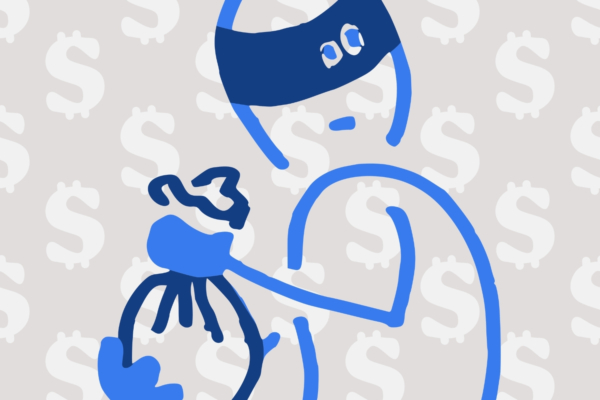
Top Ten Scams for Finances in 2023

If it feels like new scams are popping up each and every day, you’re not wrong. In 2023, experts predict the rise of even more sophisticated scam tactics that aim to con people out of their money and sensitive data— and no one is immune.
The best way to protect yourself from a scam is to know how to spot the signs. In this article, we’ll break down the top ten scams on the rise so that you can equip yourself, your finances, and your data.
1. Student Loan Forgiveness Scam
The first scam on our list preys upon student borrowers hoping to have some or all of their debt forgiven. The scam works by persuading borrowers to enroll in services that claim to erase or reduce existing student loan debt, typically for a small (in comparison to the debt amount) fee. Websites and notices oftentimes look legit, leading consumers to believe they are dealing with an organization on the up-and-up.
How to Protect Yourself Against Student Loan Forgiveness Scams
The truth is there’s no way to erase the debt outright— only the government can do that through legitimate relief programs. Be wary if the company guarantees any sort of approval or offers completely unrealistic solutions, as these are often signs of a scam.
To protect yourself, check with your loan servicer to confirm what options you have available, and make sure you’re dealing with a legitimate source when engaging in debt relief services. The Federal Trade Commission (FTC) has an article on student loan scams if you’d like more information.
2. Phishing Scams
Phishing scams have become a major problem in the digital age, costing unsuspecting consumers millions of dollars each year. Phishing scams come in the form of a phony email or text pretending to be someone or a company that they are not. Oftentimes, phishing emails look like legitimate companies or government agencies by mimicking email addresses, appearances, names, and logos. The goal is to deceive victims into providing personal information or transferring money, leading to financial loss and identity theft.
How to Avoid Phishing Scams
It’s essential to be wary of any email or text that requests you to take action, send money, click a link, or provide information. When in doubt, it’s always best to contact the intended company directly via telephone before responding.
3. Debt Collection Scams
A debt collection scam is when a fraudster impersonates a debt collector and attempts persuade people into giving them money that they don’t actually owe, oftentimes using aggressive bullying tactics. They may even go so far as creating fake accounts or websites in order to fool their targets.
How to Avoid Debt Collection Scams
To steer clear of scammers, the FTC suggests that consumers should never give out personal information like account numbers, social security numbers, or passwords over the phone or through email. Additionally, if you are contacted by someone claiming to be a collector, it’s important to ask for the person’s name and contact information. Check with your original creditor before paying off any debt and always get written communication affirming that you do not owe this said debt.
Learn more about fake debt collectors in our article: Fake Debt Collectors Exist– Here’s How to Handle Them.
4. Identity Theft Scams
Identity theft scams are sophisticated, modern-day crimes that occur when someone unlawfully obtains your personal data and uses it to commit fraud or other crimes. It can range from someone taking out loans in your name to filing tax returns with your information to getting access to your financial accounts.
How to Avoid Identity Theft
A few ways to avoid identity theft scams include regularly checking your credit report, signing up for banking alerts, and using a secure password for all of your online accounts. Additionally, if you receive phone calls from unknown numbers regarding financial matters, avoid sharing any personal information and hang up immediately.
Learn more about avoiding identity theft in our article: 11 Ways Your Identity Can Be Stolen: and How to Be Your Own Hero.
5. Crypto Scams
Crypto scams are on the rise as a result of the increasing popularity of digital currencies such as Bitcoin. Crypto scammers often entice unsuspecting consumers with offers to buy into crypto investments that, unfortunately, turn out to be fraudulent. Some of the warning signs that indicate you might be dealing with a crypto scam include requests for personal information, pressure to invest quickly, and unrealistic promises of large returns in short periods of time.
How to Avoid Crypto Scams
In order to avoid falling victim to crypto scams, it is important to verify any potential investments by researching their legitimacy. It’s also important to make sure that your online wallets and exchanges are secure, and never share your wallet details with anyone except accredited members of financial organizations. The FTC has an article on crypto scams if you’d like more information.
6. Romance Scam
Romance scam schemes may start as an online dating match or messages from a potential romantic interest. After the scammer has won the trust of the unsuspecting victim, they then present a story about needing financial help for a distant project or an emergency situation. The con can last months or even years.
How to Avoid Romance Scams
It is essential to keep your wits about you, as romance scammers can be incredibly persuasive, and their stories usually sound very convincing. Additionally, look out for requests for money or personal information, such as banking details or emails from addresses that seemingly have no connection to your online love interest.
If you ever feel like something doesn’t quite add up, do not trust the person and verify what they say with other reliable sources. The best advice is always to err on the side of caution when it comes to online relationships—never give your money or personal info to someone you haven’t met in person. The FTC has an article on romance scams if you’re looking for more information.
7. Online Purchase Scams
Are you a big fan of online shopping? If so, you should be aware of the online purchase scam.
In this scheme, scammers create a website that looks legitimate (or uses popular online marketplaces) and advertises products for sale at discount prices. When customers try to purchase the product, however, the scammers will either not deliver anything at all or send something completely different from what was ordered. They may also take your payment information and commit identity theft.
How to Avoid Online Purchase Scams
To avoid being scammed, always double-check the legitimacy of any website or individuals before attempting to make a purchase. Look for reviews or contact info that verifies its authenticity. Don’t ever give out personal information or agree to any deals without researching them first. And remember, if it sounds too good to be true, it probably is! The FTC has an article on online shopping scams if you’d like more information.
8. Tech Support Scams
These scams involve someone impersonating a tech professional to con people out of their personal information or money. In typical cases, scammers will call unsuspecting victims and pretend to be from Microsoft or another recognized high-tech company, usually offering a free service or claiming that the victim’s computer has been affected by a virus.
They will then attempt to get access to the victim’s device, often asking for passwords or remote control so they can ‘fix’ the supposed problem.
How to Avoid Tech Support Scams
If someone contacts you unprompted and claims your computer is at risk of damage, it is almost certainly a scammer. It’s always best to avoid giving them any of your personal details or paying them any money, regardless of how convincing they may sound!
Taking simple steps to verify the source of any unexpected tech support requests and exercising caution whenever providing sensitive information can help avoid falling prey to these scammers.
Learn more about tech scams in our article: Protect Yourself Against Tech Support Scams, or check out the FTC’s article.
9. Auto Scams
If you’re planning on buying a car soon, you’ll want to beware of the classic auto scam. These are a form of fraud that relies on clever manipulation of the buyer and misrepresentation of the product in order to take advantage of the buyer. Typically, scammers use counterfeit offers such as fake warranties, listings for cars that don’t exist, or cars with hidden damages in order to extract money from the buyer before they realize anything is wrong.
How to Avoid Auto Scams
To avoid getting scammed, it’s important to do thorough research about the seller and look for red flags, such as if something seems too good to be true, prices seem unusually low, or the seller doesn’t have proper ownership documentation. Having an experienced companion with you during meetings with sellers can help you stay aware of any potential scams or suspicious behavior.
Learn more about auto scams in our article: Watch Out for These 6 Auto Scams.
10. Bank Account Scams
Bank account scams come in many shapes and forms, but recently there has been an uptick in phishing emails and text messages that appear to be from your bank or credit union. These calls will alert you to (fake) unauthorized activity and prompt you to verify your personal info so they can help keep your identity safe.
How to Avoid Bank Account Scams
Always double-check emails and texts claiming to be a financial institution. Remember— banks will never ask you for your account number, passwords, or one-time codes via email or text. If you have concerns, contact banks directly through trustworthy methods without entering any personal or financial details— and only type in URLs belonging to the specific bank instead of clicking links.
Learn more about bank account scams in our article: Bank Account Scams: How to Spot a Scammer and Avoid Disaster.
Keep Your Guard Up
When in doubt, don’t click the link, don’t purchase the item, and don’t give out your information. Scammers work hard, but with a little vigilance and caution, you can foil their attempts to steal your money and identity.
Become an Amplify Member
Every Amplify account holder enjoys fee-free banking. That means no overdraft, maintenance, or other banking fees cutting into your pocket.


